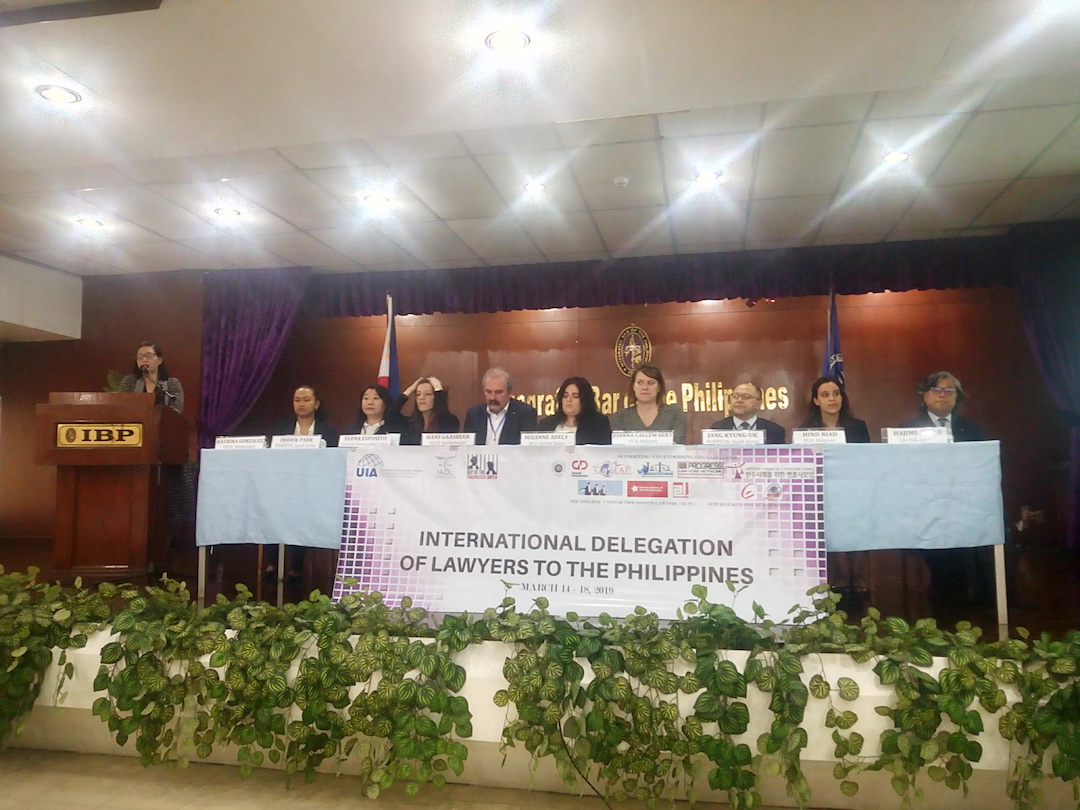“The more serious the crime, the less serious the investigation.”
By ALYSSA MAE CLARIN
Bulatlat.com
MANILA — An international fact-finding mission composed of nine lawyers from different lawyers’ organizations found clear patterns “suggesting a connection between the killings of lawyers and the actions of the Philippine National Police (PNP) and the Armed Forces of the Philippines (AFP).”
At least 37 members of the legal profession in the Philippines have been killed for exercising their duties and profession since the current administration took office in June 2016. Two paralegals of human rights lawyers have been reported as killed and the lawyers’ groups believe the number of others killed is higher.
In a press conference, March 18 at the Integrated Bar of the Philippines building, the delegation noted “recurrent elements” sustaining such connection.
First, they noted several public declarations of President Duterte targeting lawyers. Speaking about his drug war, Duterte already stated in August 2016: “…even their lawyers, I will include them”.
Second, before the killings have taken place, victims were tagged, harassed and surveilled.
Third, the perpetrators were professional, skilled shooters. They were masked killers operating on crowded public streets, and often used 22 caliber guns with silencers and rode on motorbikes.
Fourth, the lack of sufficient investigation is notable. There is no inventory of the used guns; no documented files about the killings linked to the judiciary. There has been a refusal to hear and protect witnesses and there were reported incidents of harassment of witnesses by police or military.
The lawyers’ group believes that the lack of oversight from executive bodies and law enforcement agencies further hampers progress in investigating and prosecuting these cases. This, in turn, supports the culture of impunity in the country.
“The more serious the crime, the less serious the investigation,” said Dutch lawyer Hans Gaasbeek.
Suzanne Adely, the delegation’s spokesperson, said that the biggest hindrance is the lack of witnesses willing to come forward.
“Our conversation was focused on trying to understand how the National Bureau of Investigation has investigated the specific cases they have taken up,” Adely explained. She said the delegation came to a consensus and described the investigations conducted regarding these cases as ‘unsatisfactory.’
The lawyers reported that they attempted to meet with the Philippine National Police and the Armed Forces of the Philippines but up until the time they concluded their schedule, “they did not give us an audience.”
Fifth, the killings targeted lawyers handling political cases and drug cases. The killings often happen in militarized zones. The police know what lawyers are assigned on what cases and when and where they have to appear in court.
From March 14 to March 17, the lawyers conducted interviews and conferences in Metro Manila and Iloilo with victims of rights violations and their families, and rights advocates from non-government offices. The lawyers’ delegation closely reviewed 13 incidents of reported attacks on legal professionals.
The lawyers also asked to meet with the Supreme Court but the Chief Justice designated the Philippine Judges Association president to represent the court. They also met with representatives of the Department of Justice, National Bureau of Investigation, Commission on Human Rights, the Integrated Bar of the Philippines, Manlaban and Karapatan.
The lawyers’ groups also learned that lawyers in the Philippines have been red-tagged for defending human rights, defending political dissidents, and defending victims of human rights violations. They noted that while the practice of red-tagging existed before, it has increased dramatically under the current administration.
Red-baiting is defined (in Zarate vs. Aquino III, by a dissenting Supreme Court Associate Justice) as: “the act of labeling, branding, naming and accusing individuals and/ or organizations of being left-leaning, subversives, communists or terrorists (used as) a strategy…by State agents, particularly law enforcement agencies and the military, against those perceived to be ‘threats’ or ‘enemies of the State’.”
The lawyers’ delegation has experienced for themselves an example of red-tagging. While holding a meeting in Iloilo, a poster appeared red-tagging lawyers and human rights workers. This case alarmed the lawyers’ delegation as they noted that the targeted were also tagged as belonging to a “terrorist syndicate”.
Italian lawyer Elena Esposito of the Giurist Democrati said, “A severe human rights violation, it’s not about the number (of killings) but on the rights that were hampered and threatened.”
The lawyers from Belgium, Italy, Japan, Korea, Netherlands and the U.S. called on President Rodrigo Duterte, who is also a lawyer, to refrain from publicly attacking fellow lawyers and urged him to publicly condemn all attacks against lawyers and other members of the legal profession and to abide by the UN Basic Principles on the Role of Lawyers.
Effect of attacks on PH lawyers
The delegation concluded that the attacks, harassment, intimidation of legal practitioners prevent them from fully and freely exercising their profession.
This is a direct violation of Article 2, paragraph 3 of the International Convention on Civil and Political Rights that ensures the citizens have access to justice and due process, along with Article 8 of the UN that states that everyone has equal rights to an effective judicial remedy.
“If lawyers become afraid to represent the people due to political causes, the ordinary people end up with little to no access to justice and due process,” said Adely.
Not an intervention, but a recommendation
The group put forward a list of initial recommendations in their desire to protect their peers and to ensure the independence of judges and lawyers, and to uphold basic due process for all, including those of critics and dissenters.
“We are professionals in fraternity with other professionals around the world. (The fact-finding) was done more out of concern, and not as an act of intervention (into the government),” Adely clarified. She said that the study was conducted to share awareness among professional lawyers around the world.
The delegation recommended that the government has to stop its practice of red-tagging, as well as publicly disclosing drug lists that endangers the lives of the people involved.
“From what we learned there are no criteria nor minimum evidence required to be named on these lists and names are frequently made public.”
The lawyers group also said the government should put more effort in the protection and safety of lawyers and legal workers, in accordance with the UN Basic Principles on the Role of Lawyers that ensures the safeguarding of practitioners while performing their duties and profession.
The delegation also urged everyone especially the government not to identify the lawyers by the cases they handle. They said that public authorities, including legal practitioners, must come to terms with the fact that these attacks signify a structural problem rather than a mere ‘risk for being in the legal profession.
They recommended assistance and help for the families of the victims and these include legal and financial support.
The lawyers suggested the creation of an independent, credible and partial body, one that is not under the control or influence of the government, composed of members selected exclusively from nominees from lawyer’s organizations, civil society, the church and the like in a transparent way, who are known for their human rights record, independence and integrity.
The lawyers’ delegation said that the cases of human rights violation still have a ‘long way to go’ before it could be put forth to the International Criminal Court. “The government should be the first to take a step in solving this case.”
The lawyers’ delegation is set to release a follow-up full report on their study after finalizing the data they have gathered during their stay in the Philippines.
Organized by the International Association of Democratic Lawyers (IADL), International Association of Lawyers (UIA), and Day of the Endangered Lawyer Foundation (DELF).
Want to read stories like this? Help us keep up continue writing about issues that matter.
The post Mission finds ‘patterns of state-sanctioned violence’ against Filipino lawyers appeared first on Bulatlat.




